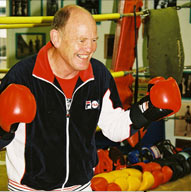
Boxing Coach (NaeNae Boxing Academy) and
Motivational Speaker
When did you first realise that you had a different way of thinking?
Right when I was at school. My teachers always thought I was a slow learner, and tried to put me into a special class. They insisted I had a problem because I couldn’t spell anything and had trouble with maths. I didn’t agree with them. I didn’t think I was a slow learner – I had very, very good memory, and I was sharp as a tack.
I went butchering in the 1960s, and one of my clients was a university professor who saw my handwriting and thought I might be dyslexic. I went for a test and it confirmed his diagnosis. All this time I’d been storing butcher’s orders in my head, thinking this was just how everyone else did it.
What was your experience of school?
It was a nightmare – they thought I had ADHD, or was ‘hyper’, as it was known in those days. I got the cane quite often because I had too much energy. I was kicked out at 14.
How did you get involved in motivational speaking?
I stumbled into it. My motivational talks began when AMP asked me to speak at their annual conference. One conference led to another and another and another. I haven’t worked since – in the sense that doing this is my passion. I started my boxing career as a wee kid with the legendary boxing coach, Dick Dunn. He helped me become a four time light welter weight boxing champion both in New Zealand and Australasia.
I’m now teaching kids personal discipline through boxing. The Naenae Boxing Academy in Lower Hutt is right in struggle town. I’ve coached one way or another for many years in gyms and schools around New Zealand. In 2005, we purchased the property in Naenae, where I grew up as a young kid.
What are the main work challenges that you have had to overcome?
A lot of people insist that you write things down. I learnt to delegate, ask for help and I learnt to listen. I still hate writing things down. I was uneducated and some would say, behind the eight ball. But I didn’t go ‘woe is me’. No one’s ever asked me what I couldn’t do. Show me and I can learn anything.
What do you think are some of the positives and negatives of dyslexia?
I don’t have to carry a pen! Having a good memory is a great asset, as well as ability with music and art. I don’t really look for negatives, but you can be prejudged.
What advice would you give young New Zealanders who are dyslexic?
Never be embarrassed to ask for help and remember you’ve a gift, so capitalise on it. Go through life with a smile on your face, and do the best you can. If you do that, you’ll never have a bad hair day. If you do, shave your head!
Click here to return.
